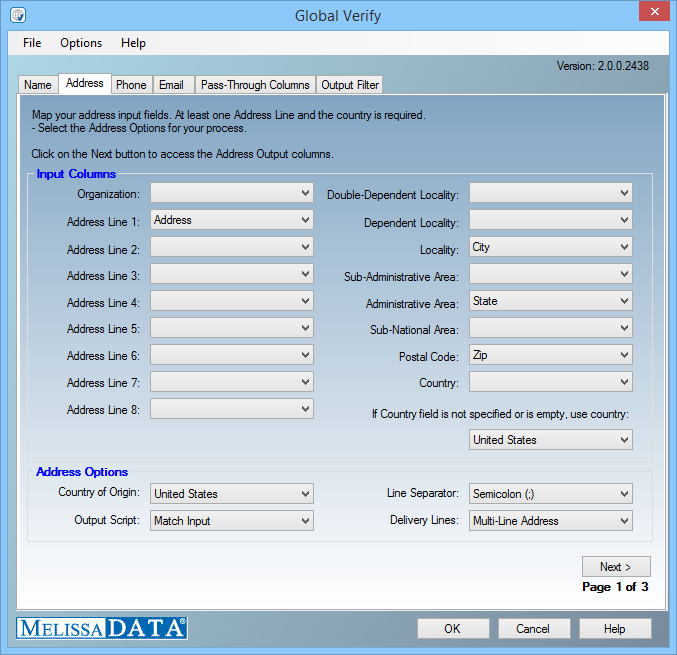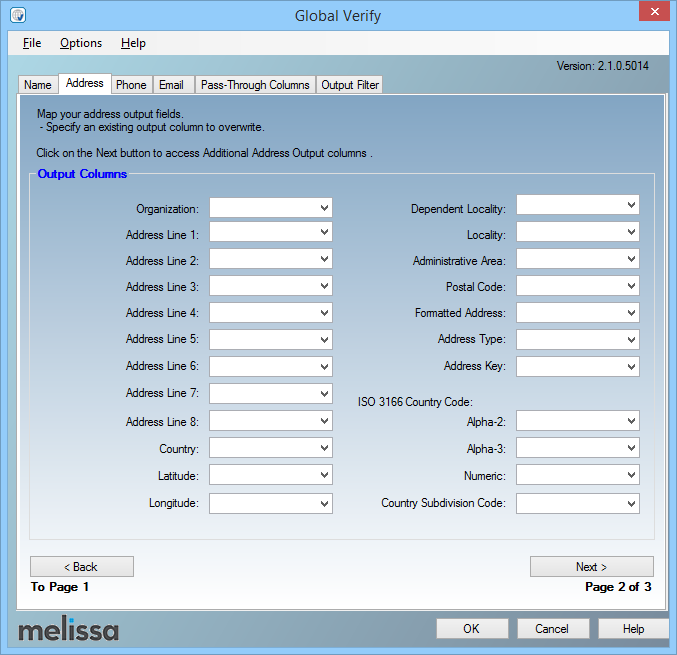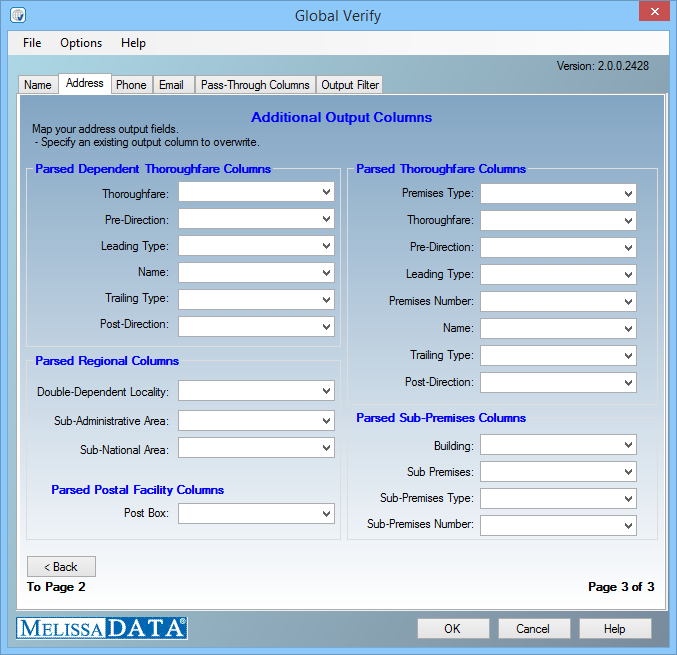This wiki is no longer being updated as of December 10, 2025.
|
SSIS:Global Verify:Address: Difference between revisions
Jump to navigation
Jump to search
No edit summary |
No edit summary |
||
| Line 133: | Line 133: | ||
;Numeric | ;Numeric | ||
:Numeric code of the output country. Ex: For United States; Canada; and the Philippines: 840; 124; 608. | :Numeric code of the output country. Ex: For United States; Canada; and the Philippines: 840; 124; 608. | ||
;Country Subdivision Code | |||
:This is the ISO3166-2 code for country subdivisions, usually tied to the administrative area for a country. The format is the 2 letter country code followed by a dash followed by 2 or 3 characters or two numbers. Examples are: US-CA, CN-16, or AU-VIC. | |||
:Currently, this field is only populated for some countries. These countries are: AE, AU, BB, BE,BH, BR, BS, CA, CN, CO, CR, DK, ES, FI, FR, DM, GH, GT, GY, HK, HN, IL, IN, IS, IT, KW, LU, MY, NI, NO, NG, NZ, MX, PH, PK, PT, SA, SG, SV, TH, US, UY. | |||
:'''Disclaimer''' - On-Premise does not support this field and will return empty. | |||
Revision as of 21:44, 23 January 2018
← SSIS:Data Quality Components
| Global Verify Navigation | |||||||
|---|---|---|---|---|---|---|---|
| Overview | |||||||
| Tutorial | |||||||
| |||||||
| |||||||
|

Map the address input and output fields. Navigate between pages 1 to 3 by using the Next and Back buttons on the bottom of the window.
Input Columns
- Organization
- The name of any organization associated with the address record.
- Address Line 1-8 (Address Line 1 Required)
- Input fields for the address. Should contain the delivery address information (house number, thoroughfare, building, suite, etc.) but should not contain locality information (locality, administrative area, postal code, etc.) which have their own inputs.
- At least one Address Line is required.
- Double-Dependent Locality
- The smallest population center data element. Depends on the Locality and Dependent Locality elements.
- Dependent Locality
- A smaller population center data element. Depends on the Locality element.
- US Term: Urbanization.
- In terms of US Addresses, this element applies only to Puerto Rican addresses. It is used to break ties when a ZIP Code is linked to multiple instances of the same address.
- Locality (Required)
- The most common population center data element.
- US Term: City.
- Canadian Term: Municipality.
- See Note 1.
- Sub-Administrative Area
- The smallest geographic data element.
- US Term: County.
- Administrative Area (Required)
- The most common geographic data element.
- US Term: State.
- Canadian Term: Province.
- See Note 1.
- Sub-National Area
- The administrative region within a country on an arbitrary level below that of the sovereign state.
- Postal Code (Required)
- The complete postal code for a particular delivery point.
- US Term: ZIP.
- Canadian Term: Postcode.
- See Note 1.
- Country (Required)
- The country name, abbreviation, or code.
- If Country field is not specified or is empty, use country
- If the Country field is not specified or empty, select a country in the drop-down menu to use.
Note 1
For US and Canada Only: You must set either Locality and Administrative Area or Postal Code. If all three elements are provided and the Postal Code is incorrect, it can be corrected from the data on the Locality and Administrative Area.
Address Options
- Country of Origin
- This is used to determine whether or not to include the country name as the last line in Formatted Address
- Acceptable Value: Any valid ISO-3166-1 Alpha-2, ISO-3166-1 Alpha-3, or ISO-3166-1 Numeric code.
- If blank, invalid, or the same as the destination country, then the destination country is not appended to the end of the formatted address.
- If valid and different from the destination country, then the destination country is appended to the formatted address.
- US or US Territory:
- If Country of Origin and destination country being verified are both US or US Territories then the country will not be appended to Formatted Address.
- US Territories will have “Unite States of America” appended if the Country of Origin is not a US Territory, but the Country Name and ISO codes will be that of the territory.
- Canada is treated like any other non-US Territory.
- Output Script
- The character set to use to format the output data.
- Match Input: Return the output in the same script used in the input.
- Latin: Convert all output to the latin character set.
- Line Separator
- The delimiter to use to separate multiple lines in the data returned by Formatted Address.
- Delivery Lines
- Select the addressing style that best describes the type of data that you would like to output.

Output Columns
- Organization
- Matches the organization input field. It is not modified or populated by Global Verify Component.
- Address Line 1-8
- Will return the standardized or corrected contents of the input address. These lines will include the entire address including the locality, administrative area, and postal code.
- Country
- The country name, abbreviation, or code.
- Latitude (US and Canada Only)
- This is parsed from the input.
- Longitude (US and Canada Only)
- This is parsed from the input.
- Dependent Locality
- A district, area, or neighborhood (Turkey) within a Locality required to uniquely identify an address.
- Locality
- A city (US), town, or municipality (Canada) that is the most common population center element within an Administrative Area.
- Administrative Area
- A state (US), province (Canada), or canton (Switzerland) contained within a Country.
- Postal Code
- The postal code or ZIP code (US) for the input address.
- Formatted Address
- The address in the correct format for mailing from the country specified. This includes the Organization as the first line, one or more lines in the origin country’s format, and the destination country (if required).
- Address Type (US and Canada Only)
- Returns a one-character code for the type of address coded.
- For a complete list of these codes, see Address Type Codes.
- Address Key (US and Canada Only)
- This is a unique key for the address.
- The Address Key can be used by other Melissa Data services, such as Geocoder or Delivery Indicator.
ISO 3166-1 Country Code
- Alpha-2
- Letter code of the output country. Ex: For United States; Canada; and the Philippines: US; CA; PH.
- Alpha-3
- Letter code of the output country. Ex: For United States; Canada; and the Philippines: USA; CAN; PHL.
- Numeric
- Numeric code of the output country. Ex: For United States; Canada; and the Philippines: 840; 124; 608.
- Country Subdivision Code
- This is the ISO3166-2 code for country subdivisions, usually tied to the administrative area for a country. The format is the 2 letter country code followed by a dash followed by 2 or 3 characters or two numbers. Examples are: US-CA, CN-16, or AU-VIC.
- Currently, this field is only populated for some countries. These countries are: AE, AU, BB, BE,BH, BR, BS, CA, CN, CO, CR, DK, ES, FI, FR, DM, GH, GT, GY, HK, HN, IL, IN, IS, IT, KW, LU, MY, NI, NO, NG, NZ, MX, PH, PK, PT, SA, SG, SV, TH, US, UY.
- Disclaimer - On-Premise does not support this field and will return empty.

Additional Output Columns
Parsed Dependent Thoroughfare Columns
- Thoroughfare
- Name of the street or block data element.
- Pre-Direction
- Prefix directional contained within the Thoroughfare field.
- Leading Type
- Leading thoroughfare type indicator within the Thoroughfare field.
- Name
- Name indicator within the Thoroughfare field.
- Trailing Type
- Trailing thoroughfare type indicator within the Thoroughfare field.
- Post-Direction
- Postfix directional contained within the Thoroughfare field.
Parsed Regional Columns
- Double-Dependent Locality
- An area or village (UK) within a Dependent Locality required to uniquely identify an address.
- Sub-Administrative Area
- Not commonly used. An arbitrary region smaller than a Country but larger than an Administrative Area.
- Sub-National Area
- A county (US) or region larger than the Locality but smaller than the Administrative Area.
Parsed Postal Facility Columns
- Post Box
- Post box information for a particular delivery point.
Parsed Thoroughfare Columns
- Premises Type
- Leading premise type indicator within premises field.
- Thoroughfare
- Name of the street or block data element.
- Pre-Direction
- Prefix directional contained within the Thoroughfare field.
- Leading Type
- Leading thoroughfare type indicator within the Thoroughfare field.
- Premises Number
- Alphanumeric indicator within premises field.
- Name
- Name indicator within the Thoroughfare field.
- Trailing Type
- Trailing thoroughfare type indicator within the Thoroughfare field.
- Post-Direction
- Postfix directional contained within the Thoroughfare field.
Parsed Sub-Premises Columns
- Building
- Descriptive name identifying an individual location.
- Sub Premises
- Alphanumeric code identifying an individual location.
- Sub-Premises Type
- Sub premises type indicator within the premises field.
- Sub-Premises Number
- Sub premises number indicator within the premises field.